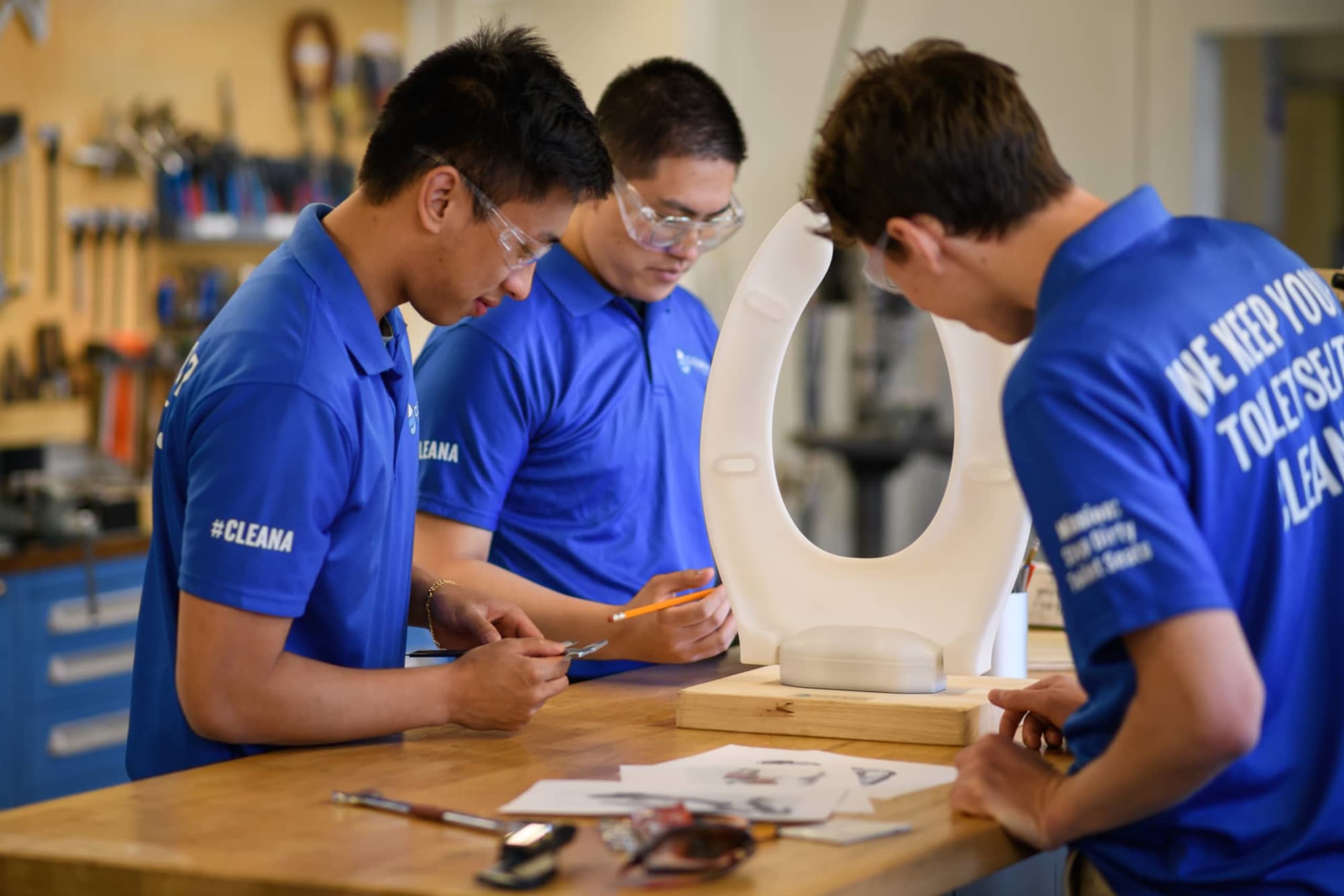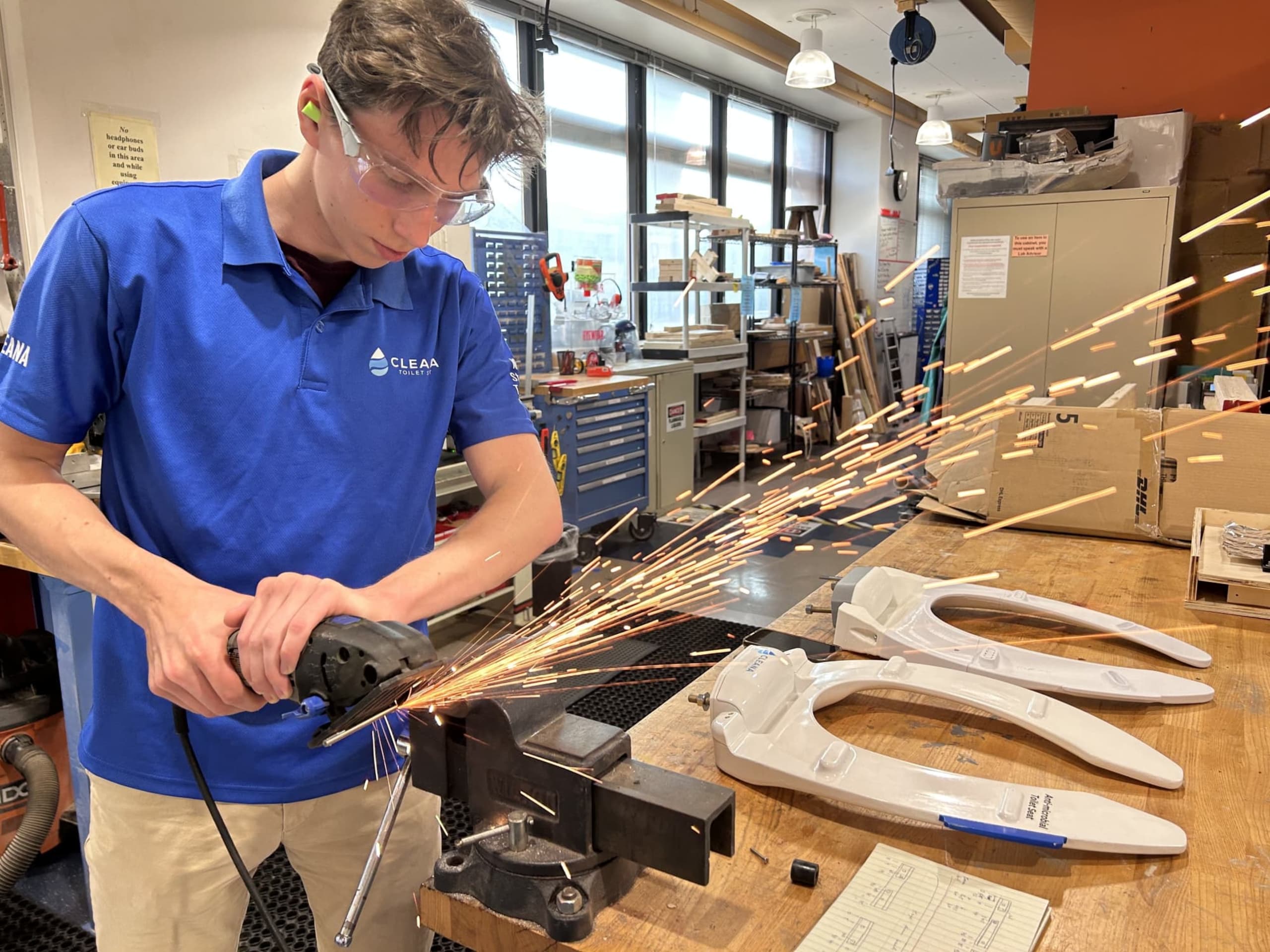Boston University Alum Offers Words of Advice for College Entrepreneurs
 Credit: Photo Courtesy of Kevin Tang/Cleana Inc
Credit: Photo Courtesy of Kevin Tang/Cleana Inc- Cleana, a company specializing in patented zero-electricity automatic toilet seats, was started by Boston University and Massachusetts Institute of Technology alums.
- The Cleana team spent four years developing the technology, surveying toilet seat users and developers to create a commercial and home seat.
- One of the company’s founders, Kevin Tang, said when creating a business, it’s important to find someone who is the opposite of you. If you’re good at business, find a good engineer, and vice versa.
- Tang said to beware of “Founder’s Syndrome” — when a founder can be blinded by their initial vision and lack adaptability as the company grows.
College entrepreneurship takes considerable skills, from forming an idea and manufacturing a product to marketing and running a business.
BestColleges connected with Kevin Tang, a recent Boston University graduate and CEO of a new zero-electricity automatic toilet seat company Cleana Inc.
“Cleana is a Boston University (BU) and MIT (Massachusetts Institute of Technology) hardware technology company,” said Tang, “basically where we design the best toilet seats in the world.”
Tang and his team at Cleana began developing their no-plug-in zero electricity seat during college and tested the technology over four years. They ended up with the cheapest automatic toilet seat on the market with patented technology.
Cleana’s home antimicrobial coated toilet seat lowers between uses and has a soft-close hinge to avoid slamming. The commercial model lifts between uses.
“From the very beginning of the venture, one of the key constraints that we had is that we need to do something that people want, but it needs to be normal people who can actually afford and benefit from those separately,” said Tang.
Tang said Cleana has already partnered with several colleges, including the University of Illinois, Stanford University, Pennsylvania State University, and New York University. Tang wants their technology to prevail and benefit people over the next 5-10 years.
Starting a Business in College
Tang began working on Cleana during his first year at BU in 2019.
Tang said he got to know his co-founders, Max Pounanov and Andy Chang, through many entrepreneurship events at BU and MIT and several machine shops at both universities.

The partnership began from something they learned from their relationships: The women in their lives like to keep the toilet lid and seat down.
Tang said a raised toilet lid and seat can also be hazardous for toddlers, pets, and dropped valuables.
The team spent the early days of development looking at as many different toilet seats as possible, talking with potential stakeholders, and developing the technology.
During development, the team talked to hundreds of people of all ages on the sidewalks to get feedback on their residential model. And they consulted with facilities managers, plumbers, retailers — anyone who would be involved in the manufacturing and installation of toilet seats.
Tang said it was challenging to get in-person testers for their seat during the COVID-19 pandemic, so they dragged a toilet with a prototype seat near an outdoor river trail in Boston.
“We would just basically stand by the side of the road and say, ‘Hey, would you sit on this toilet seat to let us know what you think? Give us your feedback!'”
“That was a while ago, though; luckily, we haven’t had to do that (since then),” Tang said.
Tang’s Core class series through BU’s business school prepared him to create a comprehensive financial model and 100-page business plan. His classes spanned marketing, operations, finance, and quantitative studies.
“What it does is it teaches you how to do really in-depth customer interviews, how to draw data from it, how to do a bunch of different analyses on desired features, the value of the customers, what it’s like to actually do … a really comprehensive financial model and then to apply a level of quantitative analysis to all of them.”
To Tang, Boston is the best place to be an entrepreneur because of its unique proximity to his alma mater BU, MIT, Harvard, community makerspaces, and diverse population demographics.
“It very much is a college town … professionals in the city respect the colleges and want to help them,” he said. “So, if you want to reach out to people in different customer segments, and they hear that you’re from the area, that’s something they respect an awful lot.”
He said there are also a lot of different demographics for product research, from higher- and lower-income people all around different areas of Boston.
Tang’s Recommendations for Budding College Entrepreneurs
But Tang warned college entrepreneurs of one of the most dangerous challenges: ego.
“There literally is a thing called “Founder’s Syndrome,” where it’s like you end up with these people who have this vision in their mind of what the business should be, and having the vision for the founder doesn’t even necessarily indicate that you are capable,” he said.
So when the business doesn’t align with their vision, they think they can do it better than anyone else. So they try to do it all themselves or are negative about other people’s work.
“And the irony of it is that usually those people don’t get as far.”
Tang said the biggest challenge was developing the core technology and being extremely open-minded to different solutions. He and the team worked tirelessly on the technology, without electronics, for the last four years — encountering various engineering constraints.
“A typical egg timer, which is what you would use, may have 25-30 different components in it between all the fasteners,” Tang said. “The mechanism that we have, including the entire architecture of the seat, has about 15 components.”
Tang said engineering is similar to computer coding; you don’t try to invent everything from scratch. You get on Github, a popular code-sharing platform, and use that.

Tang said it is also helpful to work with people who have strengths you don’t have.
“I would say the best advice for both the business guy and the engineer is to find a really good opposite of what you are,” Tang said.
He said it’s especially dangerous for engineers to have a “do it all yourself” mentality since they’re so capable. He said if someone’s a good engineer, they would want their time and efforts to be spent solely on engineering.
Tang said Cleana was lucky enough, from the beginning, to win about $50,000-$70,000 from many different entrepreneurship competitions like Boston University’s New Venture Competition. He said they’re hard to win but are worth it — The Cleana team entered some competitions 2-3 times before they succeeded.
The team also did a few entrepreneurship competitions in Utah.
“There’s one also for the University of Utah specifically,” he said. “So, for folks who are in high school and are thinking about entrepreneurship as a future, those are great places to start.”